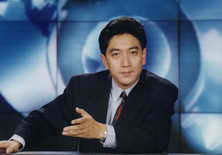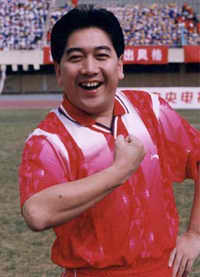| Interview with Shui Junyi |
| http://www.sina.com.cn 2003/06/09 12:46 《英语学习》 |
Y: Yang Rui, presenter of Dialogue on CCTV 9 S: Shui Junyi, journalist and TV broadcaster An experienced and savvy anchorman<注1> of CCTV Channel One, Mr. Shui Junyi has become a household name in China. He is among the first batch of journalists<注2> who set off to cover international hotspots for CCTV and his recent reporting on war in Iraq certainly marks a highlight in his journalistic career. Y: Do you think of yourself more as an anchor or a reporter, for we know you've done a lot of fieldwork<注3> as well, like in the Middle East as a wartime reporter? S: Personally I'd prefer to think of myself as a reporter. I really like the work of a reporter. I've been doing the journalistic job for more than 17 years, first with Xinhua News Agency and then with CCTV, and every time I go somewhere like Baghdad<注4> for instance, I would feel my inside burning, my blood boiling. It is a kind of work that makes you very enthusiastic. So personally, I'd rather do a reporter's job than an anchor's. But of course, being an anchor, you feel very comfortable sitting in the studio, and there's plenty of water to drink. Y: Would you attribute your current popularity more to<注5> your work as a reporter or as an anchor at CCTV? S: It is very hard to say. TV made me a public figure, since I appeared on the screen in front of millions of viewers. People have come to know about me, they know my name and my face, and even my voice. But on the other hand, I really feel that it is the job of reporting, like when I went to Baghdad, Sarajevo<注6> or Middle East, doing those wartime reporting or field reporting. When people see me interviewing presidents or heads of the states they remember me and recognize me as a successful journalist. Y: A couple of years ago, you wrote an article for a magazine, complaining that after becoming famous you hardly had enough time reading and doing your homework for your program. Do you still have the same feeling now? S: I do. Actually that article is a kind of self-criticism for myself. After working for CCTV for two or three years, I began to realize that I was getting sort of restless. I was getting concerned about my popularity. Y: Has that somehow affected the quality of your program?
Y: To what degree do you think your experiences as an editor and reporter have added to your popularity and current success? S: That meant a lot for me. It was a rich experience. It is like a reservoir<注7> from which I absorbed a lot of knowledge, learned many skills in terms of how one can be a very good journalist. The work gave me a sense of fulfillment. And to be honest, I had never imagined that I would be a TV anchor. Y: Some people in the circles of electronic media say that TV journalism is a job largely for the young people. Do you have any comments on that? S: I don't think so. Actually I am almost 40 now. I have been doing the journalistic work for about 17 years and I still don't feel like slowing down. Y: Don't you think the job is physically tough? S: It is. In fact it is both a physically and mentally challenging job. First of all, you need energy and you should be enthusiastic. You need passion for that. Sometimes you have to carry the camera, walking miles of way. Like when I was in Sarajevo as an anchor and reporter. I had to do all the jobs. Basically, it is a kind of job that requires passion and enthusiasm but I don't believe I will lose my enthusiasm or passion when I am 50 or 60 years old. I like this job. Y: What does it take to make a good anchor? S: Opportunity. My past experiences as an editor and reporter certainly helped a lot but it also takes some sort of luck to make it. I mean the viewers and the audiences just happened to like me. They just happened to enjoy or to appreciate what I was doing. They like the way I speak, the way I do the reporting and the way I talk to people. Y: As a CCTV anchor, you must have got a lot of feedback<注8> from the viewers. What do they expect of an excellent anchor? S: If you make a list of the viewers' expectations, the list can be very long. We are facing not only thousands or tens of thousands of viewers, but hundreds of millions of them. So it is very hard to say. Y: How do you react to negative responses? S: Sometimes I just laugh, and sometimes I really take some of the criticisms. Y: Can you give us some examples of that? S: Some viewers say that I always appear to be very serious as if I was thinking about human destiny or something. So I was trying to smile a bit more. But you know, since we are colleagues, you certainly have seen that I am generally like that even off the screen. Sometimes when I talk about serious stuff with friends, I tend to look quite serious and my gestures and body language also go with that. That comes very naturally for me. Sometimes the viewers said that I made some serious mistakes. For instance, two years ago, I made a very serious mistake when I was doing a live report. I said to the viewers, "We are now looking at the capital of New Zealand, Ottawa<注9>." It was a silly mistake. Y: Was it a slip of tongue? S: Yes, but still it was a mistake. And it was live, everybody was watching that and everybody heard that. Many people called me or wrote to me, saying that we cannot forgive you for that poor mistake, because you are doing one of the most important news reporting and you are representing us. Y: How did you respond to that? S: I apologized. I didn't say anything to defend myself, because I do think that was really a serious mistake. But it was a good lesson for me. After that I have been very careful, trying to avoid making mistakes like that. Y: You know viewers can be very critical of the presenters or anchors. One of the criticisms is that the presentation is sometimes more of a show than a heart-to-heart communication with the audiences. What do you think of that? S: I definitely think an anchor should be truthful and sincere with the audiences. For news anchors especially, the most important thing is to face the camera ?that means you are facing your audiences and viewers. You are talking with them just like honest friends. You don't have to act. Y: As an anchor myself, I have the feeling that if you fail to digest the content of the topic of your program, you cannot possibly do a good presentation. S: It's quite true. You have to digest. Y: Are you sure every time you are able to digest the content of the topics? S: Every time I try my best. I can't remember even once that I didn't try for one minute to digest, to prepare for the interview or for the presentation. I dare not do that. I know it is very dangerous because that would mean the end of your career. Y: What was it like when you interviewed politicians as you said earlier? S: The first celebrity I interviewed was the former Israeli Prime Minister Simon Peres<注10>. That was in 1989. I was the resident correspondent in Cairo<注11>. Mr. Peres was visiting Egypt. We tried to arrange the interview with him. When I first saw him, I was very nervous. I really didn't know what to do with myself. I couldn't put my question clearly and correctly. And I found myself asking him questions in broken English. But he was a very kind man. He was trying to help me. He said: "Could you please repeat your question slowly and word by word? Don't worry. I can understand." Y: For many Chinese viewers, much of your unique experience must be the wartime reporting. What was it like when you were in Baghdad? S: It was really terrible. Y: Why did you volunteer to go there as a wartime reporter? I suppose you were aware that it could put your life at stake<注12>? S: Of course I was aware of that. When I graduated from college, I had no experience and no interest in being a reporter. But since I began to work for Xinhua News Agency, since I became a journalist, I have gradually become very fond of this job. It means part of my life. It is something I really love. Whenever there is something happening or I can participate in something, I feel the burning inside. Y: Are you saying that you like tough challenges whatever they are? S: Not in every field of things, but when it comes to journalism, yes. Like when I heard that there was a chance to go to Bosnia<注13>, I tried to apply. I went to see my boss and said, "I want to go there. Please give me this chance, because I am a very good candidate and I promise that I can do a satisfying job." Y: I've heard an opinion that it is a shame for Chinese media not to have any reporter killed in the battlefield. Is it part of the reason that you want to go to the war zone? S: I would never want to do that for that kind of reputation. For me, I don't think that it is a journalist's destiny to go for wartime reporting and to die. A good wartime reporter is someone who can survive, someone who is very keen to the situation, who can do his job well and can accomplish his mission and come back. |
| 【英语学习论坛】【评论】【大 中 小】【打印】【关闭】 |

 中央电视台国际频道的《今日话题》节目主要由海内外知名人士或专家学者就时事热点和典型的社会文化现象进行对话。我们的《对话》频道(Dialogue Channel)栏目就是从该节目中撷取最精彩的片段进行加工整理,在浓缩其中智慧的同时也保持了其原本的口语特色,使你如同亲耳聆听他们的谈话。
中央电视台国际频道的《今日话题》节目主要由海内外知名人士或专家学者就时事热点和典型的社会文化现象进行对话。我们的《对话》频道(Dialogue Channel)栏目就是从该节目中撷取最精彩的片段进行加工整理,在浓缩其中智慧的同时也保持了其原本的口语特色,使你如同亲耳聆听他们的谈话。 S: Not really. I would think it is out of my sense of self-discipline. I realized that my celebrity was making me feel nervous and uncomfortable in my family. In front of millions of viewers, I didn't feel good for that either, because before that for the past ten years, I had been an editor and reporter and I was happy with my job. I was happy sitting in front of the computer writing stories or going to the Middle East as a correspondent. At that time, I read a lot. I studied a lot. I practiced my English and also practiced my journalistic skills.
S: Not really. I would think it is out of my sense of self-discipline. I realized that my celebrity was making me feel nervous and uncomfortable in my family. In front of millions of viewers, I didn't feel good for that either, because before that for the past ten years, I had been an editor and reporter and I was happy with my job. I was happy sitting in front of the computer writing stories or going to the Middle East as a correspondent. At that time, I read a lot. I studied a lot. I practiced my English and also practiced my journalistic skills.